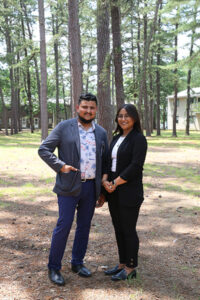
Dhan Timsina, board chairperson of Building Community in New Hampshire; and Pritisha Pradhan, Administrative Assistant at NH Legal Assistance
Dhan Timsina held the notice in his hand: The property manager of his apartment complex alleged he owed hundreds of dollars in additional rent, an unexpected bill he couldn’t afford, and one he knew he didn’t owe.
Dhan had come to New Hampshire as a refugee from Bhutan, and he lived in an apartment complex in Concord known for housing immigrant families through a subsidized housing program. The pays a certain percentage; the tenants’ portion depends on their income each month. Many tenants with low incomes work retail or maintenance jobs, and the hours they work can fluctuate considerably month to month.
Dhan knew that he had paid the correct rent every month, and he had documents to prove it. The debt was erased, and Dhan has since moved out with his family.
“I was able to get this problem fixed myself because I speak good English,” he said. “If others don’t understand what is going on or they don’t keep accurate records, they could run into trouble and possibly be evicted. They trust blindly that the management will treat them fairly.”
But he has seen other tenants, particularly new Americans, overpay rent or face wrongful evictions.
As far back as 2017, NH Legal Assistance staff attorneys Steve Tower, Kerstin Cornell, and Lindsay Lincoln worked with different families within the apartment complex to resolve rent overcharges. Those initial families spoke about legal aid to others, who reached out for assistance.
Recognizing that this community faces ongoing civil legal needs, NHLA started prioritizing outreach to Nepali immigrants.
Dhan is now the board chairperson of Building Community in New Hampshire, a nonprofit that helps refugees rebuild their lives. Among many other jobs, he helps tenants gather necessary documents to apply for legal aid.
“Dhan and BCNH have been a big help. Stronger connections with Nepali community organizations
will help us better represent this community,” Steve said. “Most of NHLA’s information is in English or
Spanish. We need to work extra hard to make sure other communities know we exist.”
NHLA hired Pritisha Pradhan in 2022 as an administrative assistant, and an asset for the program’s language access services. Pritisha comes to NHLA with experience working as an interpreter
and translator for Nepali and Hindi speakers.
“Navigating the legal system is hard enough for English speakers,” Pritisha said. “We’re making sure to provide clients with interpreters for the language they speak so they’re able to communicate with us freely and without any hindrance. We also provide translated letters to clients in their language, so they fully understand what we are trying to communicate with them.”
The effort and progress made so far has Dhan feeling optimistic that more non-English speaking residents in New Hampshire will have an easier time getting systemwide assistance when they need it.
“The legal systems in the countries these people come from may be very corrupt. When they see letters from a New Hampshire court, for instance, they panic,” Dhan said. “I’m very happy that New Hampshire Legal Assistance is committed to defending these families as they work to rebuild their lives.”

